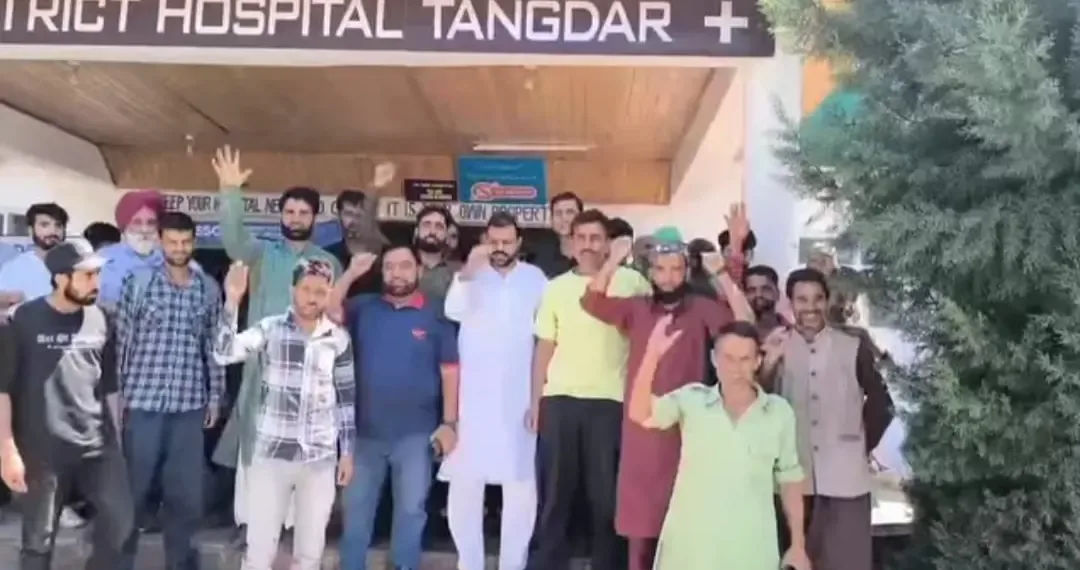Karnah Kupwara, August 21:In the border subdivision of Karnah, nestled in the rugged terrains of Jammu and Kashmir, a worsening healthcare crisis has left more than one lakh residents battling illness and uncertainty in silence. The Sub-District Hospital (SDH) Tangdhar, once envisioned as a lifeline for this isolated region, now stands broken by apathy, staff shortages, and policy paralysis. It is a tragedy unfolding in slow motion — not just of infrastructure, but of forgotten people and overlooked duty.
Each day, more than 400 patients pass through the OPD of SDH Tangdhar, and around 20 emergencies knock at its door. Yet this hospital, meant to serve thousands, has no gynecologist, no pediatrician, no surgeon, no anesthetist, and no general physician. The operation theatre is dysfunctional, not due to lack of need — but because there are simply no hands to perform surgery. Since April this year, 400 pregnant women have had to be referred to hospitals outside the region, and every day, two to three women are sent away — often in critical condition — for the most basic maternal care.
Across the Karnah health block, the story is equally grim. In july three doctors have been posted to this hospital, still no one has joined yet .Out of 31 sanctioned doctor posts, only 12 are filled. SDH Tangdhar alone requires 27 doctors but has just 6 on duty. Of 214 approved medical and paramedical posts, 103 lie vacant. PHCs like Chitterkote and Teetwal function without a single allopathic doctor. In Gabra, doctors are posted, but there is no paramedical staff to assist them. These facilities are not healing centers — they have become names on paper, shells of what they should be.
The human cost is painful. One NHM medical officer posted at SDH Tangdhar shared that he has been serving in Karnah for 18 years under the National Health Mission. He broke down while speaking to our correspondent, saying, “What crime have I committed that I’ve been stuck here without policy, without relief? I am in stress, in depression, and yet I continue to treat patients — because I know they have no one else. But I too need at least 3 to 4 years of break.” Like him, many NHM doctors serving in this hard zone for over 15 years continue without any policy for regularization, without housing, without border allowance, and without a light at the end of the tunnel.
This is not sustainable. Doctors, both under NHM and permanent posts, are working more than 160 hours a week — three times the standard — with no compensation or systemic support. Their mental and physical health is deteriorating while they carry on in silence.
Leadership too is struggling. The current Block Medical Officer is a dental surgeon, while the dental section of the hospital itself is barely functional, aided only by one technician. According to insiders, there is a communication gap between the BMO and the MBBS medical staff, further weakening coordination during an already fragile time. Civil society voices have recommended that Dr. Waseem Arif — a highly qualified and experienced pediatrician currently serving at District Hospital Handwara — be given charge as BMO. Dr. Arif, who belongs to Karnah itself, has expressed his full willingness to return and serve his people. His expertise in child healthcare and his deep connection with the region make him an ideal candidate to restore administrative order and clinical leadership at SDH Tangdhar.
And still, the most heartbreaking absence remains: there is not even one lady gynecologist posted in all of Karnah valley. This gap is not just a medical shortfall; it is a daily risk to the lives of women. The community has made repeated appeals for the urgent posting of a female gynecologist — not as a luxury, but as a life-saving necessity.
Adding to the crisis is the complete absence of a mutual transfer policy. In Ladakh, a fellow Union Territory, such a policy exists and is functional. Doctors in remote areas are rotated out after serving defined terms. But in Kashmir, no such system has been adopted. Once posted in Karnah, doctors are often left indefinitely, with no clarity, no timeline, and no path back. This discourages fresh postings and breeds long-term burnout. If Ladakh can implement such a system, why can’t Kashmir?
What the people of Karnah are demanding is not unreasonable. They are asking for fairness. For doctors who care. For leadership that listens. For policies that show they haven’t been forgotten by their own government.
They now appeal — earnestly and urgently — to the Jammu & Kashmir Health Department, the Hon’ble Lieutenant Governor, the Ministry of Health & Family Welfare, and all concerned authorities: Fill the vacant posts. Frame a clear regularization policy for NHM staff. Reinstate border area allowances. Provide proper housing and safety for posted staff. Post a lady gynecologist in SDH Tangdhar without delay. And implement a practical mutual transfer policy, as already functioning in Ladakh.
These are not just medical requirements — they are moral responsibilities. Karnah may be on the edge of the map, but its people are at the heart of the nation. And they are tired — of waiting, of suffering, and of being ignored.
As one civil society member said, “We are not just numbers. We are families, workers, children, mothers — and we deserve to live with dignity. We are not asking for sympathy. We are demanding justice.”
Now is the time for the system to act — not with promises, but with presence. Not with announcements, but with action. Karnah cannot wait any longer.


